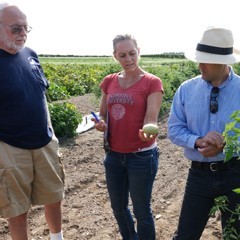Enrollment

Enrollment supports Cornell Cooperative Extension's efforts to better serve the New York commercial vegetable industry!
Enrollment in the Cornell Vegetable Program provides access to the expertise of commercial Vegetable Specialists, and includes an electronic subscription to VegEdge newsletter, telephone/email consultations, direct mailings of special event notices and important crop information, reduced registration fees for our educational meetings, and on-farm educational opportunities.
In 2025, the Cornell Vegetable Program will be supported, in part, by 14 Cornell Cooperative Extension associations: Allegany, Cattaraugus, Chautauqua, Erie, Genesee, Monroe, Niagara, Ontario, Orleans, Oswego, Seneca, Steuben, Wayne, and Yates Counties. Enrollment discounts are given to those that live, farm, or conduct agricultural services in those counties (In-Region Enrollment). However, we still welcome those that do not live, farm or conduct ag services in those counties to enroll in our program (Satellite Enrollment). See the Enrollment Information PDF for a list of enrollment benefits covered under each type of enrollment.
You may enroll in our program online (form below) or by printing and mailing the Enrollment Form PDF below.
CVP Enrollment Info (PDF; 224KB)
CVP Enrollment Form (PDF; 261KB)
Enrollment Form - Online

Upcoming Events
African Eggplant Participatory Breeding Kick-Off
March 5, 2026
Join us to learn about the Cornell African Eggplant Research Project and learn how you can participate! African eggplant, also known as Bitterball, Garden Egg, Kittley and other names, is an important crop for many members of our community with heritage from regions such as sub-Saharan Africa, Southeast Asia, and Brazil. Since 2024, the Cornell African Eggplant Research Project has been collaborating with growers and community partners across New York to develop high-quality varieties adapted to the Northeast U.S. In this meeting, we will share information about growing and preparing African eggplant, highlight our research to date, and invite partners to collaborate with us in our 2026 participatory breeding and variety selection efforts.
COST: FREE! You must pre-register to receive the Zoom link.
Managing the Invasive Swede Midge Webinar
March 6, 2026
Swede midge is an invasive fly that causes serious economic losses to brassica crops. Due to its small size and hidden feeding habits, swede midge is often called an "invisible pest" and damage may be misdiagnosed. In this webinar, we will review the swede midge life cycle and crop damage symptoms, current management recommendations, new research findings, and highlights from on-farm case studies with a focus on organic management.
1.75 DEC pesticide recertification credits in categories 1a, 10, and 23.
Good Agricultural Practices (GAPs) Food Safety Training
March 10, 2026
Newark, NY
Learn about food safety on the farm! This event hosted by the Cornell Vegetable Program, Cornell Lake Ontario Fruit Team, CCE Wayne County, and the NYS Department of Agriculture, will cover good agricultural practices (GAPs) to help reduce the risk of microbial contamination on the farm, keeping food and consumers safe.


































